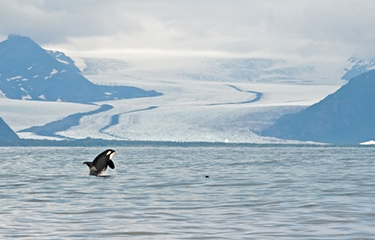Ten killer whales have been caught incidentally as bycatch by Alaska trawling vessels so far in 2023, only one of which survived, according to NOAA Fisheries.
The number of incidents – which took place between 6 May and 9 September – is higher than usual for such a short time period, raising alarms at the agency.
“NOAA Fisheries is analyzing collected data to determine the cause of injury or death and determine which stocks these whales belong to through a review of genetic information,” NOAA Fisheries said in a statement. “The agency is working quickly to evaluate these incidents and will share findings as soon as possible after all required analyses are completed. We expect to have some preliminary information within the next few weeks.”
“It’s absolutely not acceptable to have even a single killer whale caught as bycatch let alone the 10 recorded,” Seattle, Washington, U.S.A.-based conservation group Orca Conservancy said on social media.
The agency also revealed that a killer whale was caught during a longline survey for sablefish and groundfish conducted by the Alaska Fisheries Science Center over the summer. A dead killer whale was found entangled in the survey’s gear on 7 June, and the incident is under review.
The Groundfish Forum, a trade associate representing five trawling companies, acknowledged in a statement that “a number of these encounters” occurred on its members’ vessels.
“Past encounters resulting in mortality or serious injury of killer whales on Alaska commercial fishing boats and killer whales are rare,” the Groundfish Forum said. “Prior to the recent spike, NOAA has reported only seven killer whale mortalities/serious injuries resulting from fishing gear entanglement … over the seven-year period from 2014 to 2020.”
However, the Groundfish Forum noted that its vessels are seeing killer whales more frequently around their commercial fishing operations.
“In 2023, our captains have reported an increase in the number of killer whales present near our vessels, where they appear to be feeding in front of the nets while fishing,” the trade association said. “This new behavior has not been previously documented and marine mammal scientists are not sure why this change has occurred.”
The Groundfish Forum also pushed back against assertions that deck sorting activities were contributing to killer whale takes.
“We have heard assertions that killer whale mortalities and injuries are associated with our efforts to reduce halibut bycatch by deck sorting, or returning halibut to the water when caught,” it said. “These assertions are not true because our vessels do not conduct deck sorting when killer whales are present.”
NOAA Fisheries noted that the vessels involved in the various incidents were required to carry agency observers, and the Groundfish Forum confirmed that observers were present for the takes involving its members.
The Groundfish Forum added that its members are changing the way their vessels operate to avoid whales and voluntarily stopping operations this year in the areas where killer whale mortalities took place.
“Our fleet is committed to finding solutions to this unprecedented challenge,” the Groundfish Forum said. “We have invested in research activities to better understand the change in killer whale behavior and how to avoid them. Vessels are experimenting with gear modifications that may prevent whales from entering the net.”
The incidental take news will likely further stoke tensions between Alaska pollock trawlers and Alaska salmon fishermen. The two communities have been in a pitched battle over the area’s resources, with salmon fishermen claiming that industrial trawling operations are allowed to take too much bycatch, damaging other fisheries and marine life.
“We’ve seen multiple species of salmon dramatically decline on the Kuskokwim in recent decades, including Chinook and chum salmon, both of which are caught as bycatch by the Bering Sea pollock trawl fleet,” Kuskokwim River Inter-Tribal Fish Commission Executive Director Kevin Whitworth said. “These declines are devastating for our communities and our ways of life, and they’re happening in part because marine managers at the North Pacific Fishery Management Council and NOAA Fisheries do not equitably consider our traditional foods or our Tribes when making decisions about pollock allocation.”
Salmon fishermen have also faced a lawsuit from conservationists claiming that commercial salmon fishing is hurting the southern resident killer whale population.
Photo courtesy of Shutterstock / Martin Prochazkacz







